| 3 January |
• yesterday • tomorrow |
| Optional Memorial of the Holy Name of Jesus |

Chanoch, Henoch, Henok
• 22 January (Coptic Church)
• 19 July (his assumption in the Coptic Church)
• 7 July on some calendars
• 30 July on some calendars
• Tuesday after Easter (Syriac menologies)
Old Testament Patriarch, a descendant of Seth and ancestor of Noah. He is mentioned by other writers in the Old and New Testaments, and an extensive library of legends has grown up around him.
When Jared had lived a hundred and sixty-two years he became the father of Enoch. Jared lived after the birth of Enoch eight hundred years, and had other sons and daughters. Thus all the days of Jared were nine hundred and sixty-two years; and he died. When Enoch had lived sixty-five years, he became the father of Methu’selah. Enoch walked with God after the birth of Methu’selah three hundred years, and had other sons and daughters. Thus all the days of Enoch were three hundred and sixty-five years. Enoch walked with God; and he was not, for God took him. – Genesis 5:18-24 (RSVCE)
By faith Enoch was taken up so that he should not see death; and he was not found, because God had taken him. Now before he was taken he was attested as having pleased God. – Hebrews 11:5 (RSVCE)
Enoch pleased the Lord, and was taken up; he was an example of repentance to all generations. – Sirach 44:15 (RSVCE)
It was of these also that Enoch in the seventh generation from Adam prophesied, saying, "Behold, the Lord came with his holy myriads, to execute judgment on all, and to convict all the ungodly of all their deeds of ungodliness which they have committed in such an ungodly way, and of all the harsh things which ungodly sinners have spoken against him." These are grumblers, malcontents, following their own passions, loud-mouthed boasters, flattering people to gain advantage. – Jude 1:14-15 (RSVCE)
https://catholicsaints.info/enoch-the-patriarch/

Genovefa
28 October (translation of relics)
When she was seven years old, Genevieve met Saint Germanus of Auxerre on his way to England. Germain befriended her because of her insistence on wanting to live her life for God, and prophesied her future sanctity. She took the veil at age 15. Prophesied invasions and disasters for Paris. Could read consciences and calm the possessed. When Paris was besieged by the Franks, she encouraged its defense, organized prayers for God's protection of the city, and led an expedition for food to relieve the siege. Caused a church to be built on the tomb of Saint Denis. In 1129, the procession of her relics through Paris is believed to have ended an epidemic.
422 at Nanterre near Paris, France
• 500 at Paris, France
• interred in the church of Saints Peter and Paul in Paris
• relics destroyed in 1871
• against plague
• against disasters
• against fever
• French security forces (chosen in 1962)
• Paris, France
• WACs
• Women's Army Corps
• bread (from feeding the people)
• candle
• cattle
• girl restoring eyesight to her mother
• keys
• shepherdess holding a candle which the devil is trying to extinguish and angels are helping to protect
• shepherdess with a coin suspended around her neck
https://catholicsaints.info/saint-genevieve/
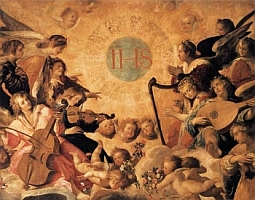
• 14 January (Franciscans, Carmelites, Augustinians)
• 15 January (Dominicans)
• 1 January (Eastern Churches; Lutheran)
• 7 August (Anglican)
A remembrance and celebration of the conferral of the Holy Name of Jesus. It is celebrated on 3 January. A separate votive Mass under this title is found in the revised Roman Missal, and may be used for an annual celebration (e.g. titular of a Church), or as an expression of devotion which is part of the tradition and spirituality of a religious order. It was formerly listed as the Sunday between 1 and 6 January, if one occurs. Instituted in the 15th century by the bishops of Germany, Scotland, England, and Belgium. It was extended to the universal Church in 1721. There is a commemoration in the Mass of the Octave of Saint Stephen if the feast is kept on the second, of Saint John on the third, and of the Holy Innocents on the fourth of January.
• Raleigh, North Carolina, diocese of
• Pratovecchio, Italy
O God, who hast caused the most glorious name of thine only-begotten Son our Lord Jesus Christ to be loved by thy faithful people with the greatest affection ; and hast made it to all evil spirits a source of terror and dismay : grant that all those who devoutly venerate this holy name of Jesus here on earth may in this present life enjoy therefrom the sweetness of holy consolation, and in the life to come may obtain the joy of never-ending gladness. - Sarum Missal
https://catholicsaints.info/feast-of-the-holy-name-of-jesus/

• Blitmund of St-Valéry
• Blitmund of Leuconay
• Blitmund of Picardië
• Blidmundus, Blimond, Blimont, Blimundus, Blithmundus, Blithumund, Blitmond, Gogus
Born to the nobility, as a young man, Blitmund moved to northern France to live as a hermit along the River Somme in Leuconay. In 611 he built a chapel and two cells in the area. He brought a hanged man back to life, which caused the spread of his reputation as a miracle worker and holy man. This, in turn, led to would-be spiritual students gathering around him and living in a nearby monastery.
For unexplained reasons, Blitmund lost the use of his legs; he was healed of this paralysis c.615 by his friend and spiritual teacher Saint Valery of Leucone. Blitmund then became a monk at Valery‘s monastery. When the house was destroyed by local pagans c.620, Blitmund led a group of the monks to Bobbio, Italy where they established the community in a monastery established by Saint Columban, spiritual teacher of Valery. Spritiual student of Saint Attalas of Bobbio.
Around 627, Blitmund returned to the area of Leucone, France where he lived for a year as a hermit before receiving permission to build another abbey. He served as its abbot, and made Leucone a site of pilgrimage, piety and learning, and a hub for evanglization that eventually converted the region. The area was later known as Saint-Valéry, and now the village of Saint-Valery-sur-Somme.
late 6th-century in the Dauphiné region of modern France
• 660 of natural causes
• relics later enshrined in Leucone in a building he and Saint Valery had built
https://catholicsaints.info/saint-blitmund-of-bobbio/
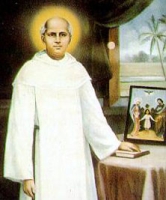
• Cyriacus Elias Chavara
• Cyriac Elias Chavara
• Kuriakose of the Holy Family
Studied with a Hindu teacher until age 10, and learned a variety of languages and regional dialects. Entered the seminary in 1818; ordained on 29 November 1829. Co-founder and first prior-general of the Congregation of the Carmelites of Mary Immaculate. The main work of the Congregation is education aiming at the intellectual, social, economic, moral and spiritual advancement of people, especially women and children; it works today in eight countries with almost 5,000 members. Kuriakose made his religious profession in the Congregation in 1855. Vicar-general for the Syro-Malabar church in 1861. Defended ecclesial unity which was threatened by schism by the consecration of Nestorian bishops in his area. Worked to renew the faith in Malabar. Co-founder of the Congregation of the Sisters of the Mother of Carmel in 1866. Known as a man of prayer with a devotion to the Eucharist and the Virgin Mary.
10 February 1805 at Kainakary, Kersala, India
• 3 January 1871 at Koonammuva, India of natural causes
• relics transferred to Mannanam in 1889
• 23 November 2014 by Pope Francis
• his canonization miracle involved the cure of an eye disorder suffered by a girl named Maria in 2007
https://catholicsaints.info/saint-kuriakose-elias-chavara/
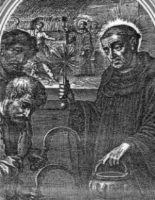
Fiontan, Fintanus
Son of Pipan and Aes; brother of Saint Finlugh. Spiritual student of Saint Comgall at Bangor Abbey. Abbot at Doon, Limerick, Ireland. A holy well dedicated to him is still venerated at Doon. Many miracle stories were attached to him over the years.
Irish
6th century in Ireland of natural causes
Doon, Ireland
monk with sickles or wheat (legend says that to prove the power of Christianity, he had a leperwheat ready for harvest, which he then baked into bread for the lepers)
Being brothers both in the flesh and in the Faith O honoured Fintan and Finlugh, you served our Saviour in your native land winning souls for Him by feats of ascetic piety. Cease not your love for men, praying that our souls may also be saved. - troparion of Saint Fintan and Saint Finlugh
By the mercy of our God thy miraculous well still bestows the blessing of healing on those who come in faith, O Father Fintan. Telling the spiritual waters of thy unshakable faith we sing thy praises, together with thy brother Finlugh, and we rejoice in your glory. - kontakion of Saint Fintan and Saint Finlugh
https://catholicsaints.info/saint-fintan-of-doon/
Finlag, Finlug, Fionnlugh, Finlogh, Finloghait, Finlay
Son of Pipan and Aes; brother of Saint Fintan of Doon. Spiritual student of Saint Columba of Iona in Scotland. Abbot in a Columban monastery in County Derry, Ireland.
Irish
6th century in Ireland of natural causes
Being brothers both in the flesh and in the Faith, O honoured Fintan and Finlugh, you served our Saviour in your native land winning souls for Him by feats of ascetic piety. Cease not your love for men, praying that our souls may also be saved. - troparion of Saint Fintan and Saint Finlugh
By the mercy of our God thy miraculous well still bestows the blessing of healing on those who come in faith, O Father Fintan. Telling the spiritual waters of thy unshakable faith we sing thy praises, together with thy brother Finlugh, and we rejoice in your glory. - kontakion of Saint Fintan and Saint Finlugh
https://catholicsaints.info/saint-finlugh/
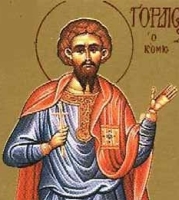
• Gordius of Caesarea
• Gordius the Centurian
2 March (Syrian Orthodox)
Soldier in Caesarea, Cappadocia. Convert to Christianity. Dismissed from the army as his religion made his loyalties questionable to the authorities. Lived as a desert hermit. During the persecutions of Diocletian, he turned himself over to the authorities so he could publicly proclaim his faith. Martyr.
beheaded in 304
Inflamed with zeal for the Faith, of thine own free will thou didst hasten to the stadium and rejoice in the contest there. Thou didst quench the flames of evil in the streams of thy blood by beheading, O Prize-winner. The life-giver has glorified thee, O Gordius. - troparion of Saint Gordius
https://catholicsaints.info/saint-gordius-of-cappadocia/
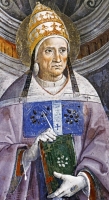
Anteros, Anterus, Antheros
5 August (Orthodox)
Son of Romulus. His family seems to have orginally been from Greece. Served as 19th Pope for about six weeks. Started the Vatican library to preserve documents concerning the early martyrs. Martyred in the persecutions of Maximus Thrax when he refused to relinquish court records of the persecutions.
Petilia Policastro, Italy
21 November 235
• martyred 3 January 236
• buried in the catacombs at the Cemetery of Saint Callistus, Rome, the first pope buried in the papal crypt
• relics re-discovered in 1854
https://catholicsaints.info/pope-saint-antherus/
• Hymnemodus of San-Moritz
• Enemodus, Himnemond, Hymnemode, Hymnodus, Hynnemond, Ymnemodus
Official in the court of King Gundobad of Burgundy. Feeling a call to the religious life, Hymnodus entered the monastery of Grigney in Vienne, France; he was later chosen abbot of the house. In 515, he was appointed abbot of the monastery of Saint Moritz at the site of the massacre of the Theban Legion. With royal support and financing, the monastery expanded and in later centuries became a major religious center and pilgrimage site.
455 in Gaul (modern France), probably in the area of Burgundy
3 January 516 of natural causes
https://catholicsaints.info/saint-hymnemodus-of-saint-maurice/
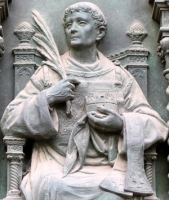
Jewish convert. Deacon to Saint Prosdocimus of Padua, and assisted in his missionary work. Martyed for his efforts during the persecutions of Marcus Aurelius.
• nailed to a table to die of shock and blood loss in 168 at Padua, Italy
• relics re-discovered c.1000 and found incorrupt
• relics solemnly enshrined on 3 January 1064
• lost articles
• prisoners
• women whose husbands are at war
• Padua, Italy
• deacon holding a towel and laver to indicate his service to his bishop
• palm of martyrdom
https://catholicsaints.info/saint-daniel-of-padua/
Bertilia of Marolles
8 October (translation of relics)
Born to the Frankish nobility, the daughter of Ricomer and Gertrude. Noted in her youth for her piety and charity. Married to Goutland, another Frankish noble noted for his own piety. Widow. She built a church dedicated to Saint Amandus of Maastricht, and moved into an adjoining cell where she lived as an anchoress the rest of her days.
Belgium
• 687 in Mareuil, Belgium of natural causes
• buried in the church of Saint-Amand in Mareuil
• re-interred in 1081
• relics enshrined on 8 October 1288
https://catholicsaints.info/saint-bertilia-of-mareuil/
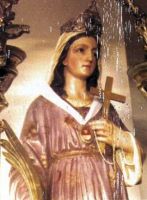
• 29 April (procession of her statue in Cuglieri, Italy)
• 30 April (translation of relics)
Pious young woman martyred in the persecutions of Diocletian.
• c.300 on Sarda (modern Shurdhah Island, Albania)
• interred in the church of San Lussorio
• relics re-discovered in 1628, and moved to the Basilica Insigne Collegiate Church of Santa Maria della Neve in Cuglieri, Italy
Cuglieri, Italy
https://catholicsaints.info/saint-imbenia/
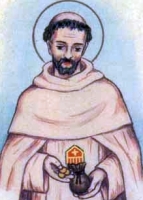
Mercedarian friar at Barcelona, Spain. Prior of his house. At one point he became involved in political maneuvers involving both Church and State authorities; it led to civil protection and benefits to the convent. Wrote biographies of Saint Peter Nolasco and Blessed Maria de Cervellón; they were used in the canonization process.
• early 15 century of natural causes
• buried at the monastery at Barcelona, Spain
https://catholicsaints.info/blessed-william-vives/
Teogene, Théogène
Priest. Bishop of Parios, Asia Minor. Ordered to join the imperial Roman army during the reign of emperor Licinius, he refused as it would require him to sacrifice to idols. Arrested, he was imprisoned without food for 40 days; he prayed for and converted some of soldiers, and survived the sentence. Tortured and executed. Martyr.
drowned in 320 at Cyzicus on the Hellespont
https://catholicsaints.info/saint-theogenes-of-cyzicus/
4 January (Orthodox; Armenian,; Syrian)
Tortured for his faith in Cilicia (part of modern Turkey) in the persecutions of Diocletian. His heroic suffering was the cause for the conversion of Saint Athanasius. He survived the persecutions to become a hermit for the remainder of his life. Because of his suffering and willingness to die for the faith, he is often listed as a martyr.
https://catholicsaints.info/saint-zosimus-of-cilicia/

Heopompus, Teopempto, Theopompus, Theopontus
27 December (Armenian)
Bishop of Nicomedia, Bithynia (in modern Turkey). Converted Saint Theonas. Martyred in the persecutions of Diocletian.
284
https://catholicsaints.info/saint-theopemptus-of-nicomedia/
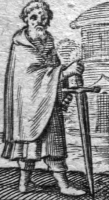
• Peter Balsam
• Peter Aulanus
• Petrus Balsamus
• Pierre Basalme
Imprisoned, tortured and martyred for his faith.
Palestine
crucified c.311 in the region of Greece and Albania
https://catholicsaints.info/saint-peter-of-palestine/
A witness to the torture of Zosimus of Cilicia in the persecution of Diocletian. The courage and faith of Zosimus caused Athanasius to convert. He was then tortured along with Zosimus. He survived the persecutions to become a hermit for the remainder of his life. Because of his suffering and willingness to die for the faith, he is often listed as a martyr.
https://catholicsaints.info/saint-athanasius-of-cilicia/

Synesius, Teonas
• 5 January (Orthodox)
• 19 January (Armenian)
Pagan magician. Convert, brought to Christianity by Saint Theopemptus of Nicomedia. Martyred in the persecutions of Diocletian.
284
https://catholicsaints.info/saint-theonas/
Meilleur, Melar, Melior, Meliorus, Melon, Melor, Melorus, Mylor
1 October (translation of relics)
Venerated in Amesbury, Wiltshire, England and in Quimper, Brittany, France.
Cornwall, England
https://catholicsaints.info/saint-melorius/
Premonstratensian monk. Canon of the monastery of Saint Cornelius in Ninove, Belgium. Prior of the monastery for 40 years. Abbot of the house.
early 12th century
1190 of natural causes
https://catholicsaints.info/blessed-arnold-wala/
Bertilia
Born a princess. Married to Saint Walbert of Hainault. Mother of Saint Waltrude and Saint Aldegundis.
c.660 of natural causes
https://catholicsaints.info/saint-bertille-of-thuringia/
Florens, Florent
Fourth century bishop of Vienne, France. Attended the Council of Valence in 374.
377 in Vienne, France of natural causes
https://catholicsaints.info/saint-florentius-of-vienne/
Third century bishop of Vienne, France. Exiled from Vienne by Emperor Gallienus. Martyred while in exile.
c.275
https://catholicsaints.info/saint-florentius-of-vienne-the-martyr/
Soldier in the Roman army. Martyr.
320 at Cyzicus on the Hellespont (part of modern Turkey)
https://catholicsaints.info/saint-cyrinus-of-cyzicus/
Eustade
Pious 6th-century monk. Abbot of Saint-Benignus Abbey in Dijon, France. Great-uncle of Saint Gregory of Tours.
https://catholicsaints.info/saint-eustadius/
Soldier in the Roman army. Martyr.
320 at Cyzicus on the Hellespont
https://catholicsaints.info/saint-primus-of-cyzicus/
Daniel Himmerod the Younger
Cistercian monk.
https://catholicsaints.info/blessed-daniel-of-himmerod/
Early sixth-century bishop of Gap, France. Attended the Council of Orange in 519.
https://catholicsaints.info/saint-constant-of-gap/
Lucien
Bishop of Lentini, Sicily.
https://catholicsaints.info/saint-lucian-of-lentini/
Listed on several liturgical calendars, but no details of his life have survived.
Wales
https://catholicsaints.info/saint-wenog/
Bishop of Belluno, Italy. Miracle worker.
https://catholicsaints.info/saint-salvator-of-belluno/
A group of Christians martyred together in Africa, date unknown, exact location unknown. We know nothing more than their names - Acuta, Candidus, Constantius, Eugenia, Firmus, Hilarinus, Lucida, Martial, Poenica, Possessor, Rogatianus and Statutianus.
https://catholicsaints.info/martyrs-of-africa-3-january/
A group of Christians martyred together, date unknown. We know nothing more than their names - Claudon, Diogenius, Eugene, Eugentus, Pinna, Rhodes and Rhodo.
at Tomi, Exinius Pontus, Moesia (modern Constanta, Romania)
https://catholicsaints.info/martyrs-of-tomi-3-january/
CatholicSaints.Info Portable Edition